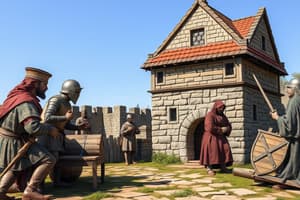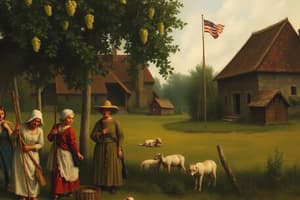Podcast
Questions and Answers
What is the Manorial System?
What is the Manorial System?
- A political system in the Middle Ages
- An economic system built around large estates called manors (correct)
- A religious doctrine
- A social class structure
What were manors?
What were manors?
Large estates that included a village and the land surrounding it.
Serfs were allowed to leave the manor without the lord's permission.
Serfs were allowed to leave the manor without the lord's permission.
False (B)
What characterized the life of a serf?
What characterized the life of a serf?
What did peasants pay for the privilege of living on the lord's land?
What did peasants pay for the privilege of living on the lord's land?
Who were freemen?
Who were freemen?
Peasants could bake bread anywhere without punishment.
Peasants could bake bread anywhere without punishment.
A tithe represented one-tenth of a peasant's _____ .
A tithe represented one-tenth of a peasant's _____ .
Flashcards are hidden until you start studying
Study Notes
Manorial System Overview
- An economic structure prevalent during the Middle Ages centered around large estates called manors.
- Manorial estates consist of a village and the surrounding agricultural land.
Manors
- Functioned as self-sufficient units where the majority of daily necessities were produced internally.
- Residents relied on the manor for food, shelter, and various goods.
Serfs
- Peasants bound to lords' land, working the fields as part of the feudal system.
- Restricted freedom: could not leave the manor or marry without the lord's permission.
- In exchange for labor, serfs were allowed to farm a portion of land for their sustenance.
- Lords were obligated to protect the serfs in return for their work.
Life of a Serf
- Serfs rarely left the manor, requiring permission for any travel.
- Life involved strenuous labor, including long hours working in the lord's fields as well as their own.
- Daily existence was characterized by hardship and limited personal freedom.
Harshness of Manor Life
- Peasants paid significant dues for the privilege of residing on the lord's land.
- Taxes included a fee on all grain processed in the lord's mill; attempting to grind elsewhere was deemed illegal.
- Weddings required the lord's consent, resulting in a tax for marriages.
- Peasant families were also expected to pay a tithe, or church tax, amounting to one-tenth of their income.
Freemen
- Skilled laborers who paid rent to nobles, enjoying the freedom to leave the manor.
- Examples of freemen include tradespeople such as blacksmiths and millers.
Studying That Suits You
Use AI to generate personalized quizzes and flashcards to suit your learning preferences.




